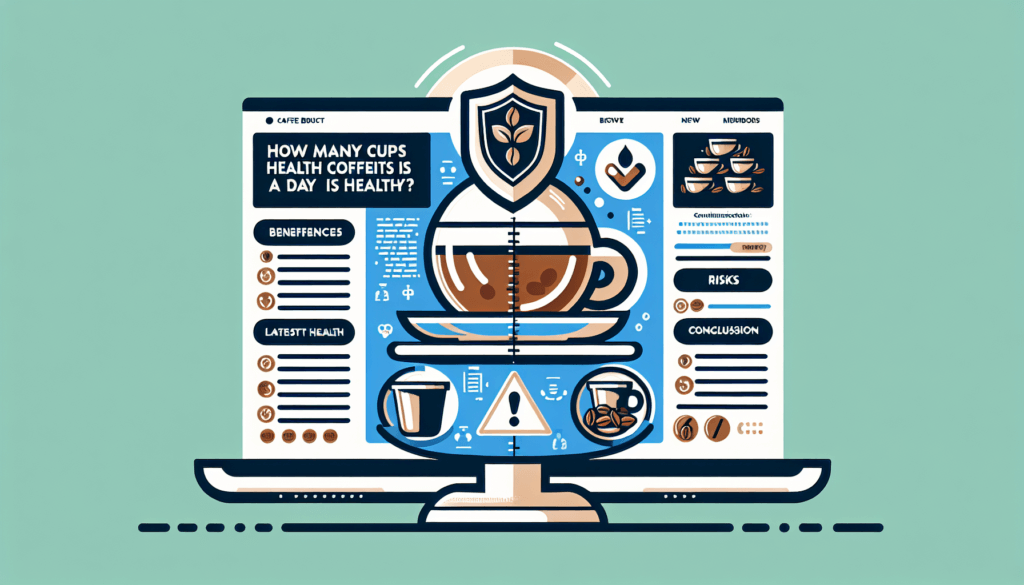Did you know that coffee is one of the most widely consumed beverages in the world? Whether you’re a coffee connoisseur or just enjoy a good cup to kickstart your day, you might be wondering, how many cups of coffee a day is actually healthy? Well, the answer isn’t as straightforward as you might think. While moderate coffee consumption can have its benefits, going overboard can have negative effects on your health. So, in this article, we’ll explore the science behind coffee consumption and guide you on finding the perfect balance for a healthy and enjoyable caffeine fix.

The Health Effects of Coffee
Positive Effects
Coffee is a beloved and popular beverage enjoyed by millions of people worldwide. It is not only a delicious indulgence but also has numerous positive effects on health. Studies have shown that moderate consumption of coffee can provide several benefits to your overall well-being.
Firstly, coffee has been found to boost physical performance. The caffeine in coffee stimulates the nervous system and increases adrenaline levels, resulting in enhanced physical performance during activities like exercise. This can help you feel more energized, focused, and capable of performing at your best.
In addition to improving physical performance, coffee can also enhance brain function. The caffeine in coffee acts as a natural stimulant, improving mental alertness, concentration, and cognition. It can help you stay more focused and productive, especially during long workdays or when you need an extra mental boost.
Furthermore, regular coffee consumption has been associated with a reduced risk of certain diseases. Studies have shown that people who drink coffee regularly have a lower risk of developing conditions such as Parkinson’s disease, Alzheimer’s disease, and certain types of cancer, including liver and colorectal cancer. Coffee contains antioxidants and other bioactive compounds that may have protective effects against these diseases.
Coffee is also a good source of essential nutrients. It contains important vitamins and minerals like riboflavin, pantothenic acid, manganese, potassium, and magnesium. These nutrients play vital roles in various bodily functions, such as energy metabolism and maintaining healthy bones and teeth.
However, it is important to note that coffee may cause digestive discomfort for some individuals. It can stimulate the production of stomach acid, which may lead to acid reflux, heartburn, or other gastrointestinal issues. If you experience any digestive discomfort after consuming coffee, it may be advisable to reduce your intake or try different brewing methods to minimize these effects.
Negative Effects
While moderate coffee consumption can offer several health benefits, excessive intake or individual sensitivities may lead to negative effects. It is crucial to be mindful of your coffee intake and understand how it may affect your health.
One of the most common negative effects of excessive coffee consumption is insomnia. Coffee contains caffeine, a stimulant that can interfere with sleep by blocking sleep-inducing chemicals in the brain. Consuming large amounts of coffee, especially close to bedtime, can make it harder for you to fall asleep and may disrupt your sleep quality.
Coffee can also cause digestive issues in some individuals. The high acidity of coffee can irritate the lining of the stomach, leading to symptoms like stomach pain, bloating, and diarrhea. People with sensitive stomachs or pre-existing digestive conditions, such as gastritis or irritable bowel syndrome (IBS), may be more prone to experiencing these issues.
Another negative effect of excessive coffee consumption is an increased heart rate. Caffeine stimulates the central nervous system, which can cause a temporary increase in heart rate and blood pressure. While this effect may not be harmful for most healthy individuals, those with underlying cardiovascular conditions may be more susceptible to adverse effects.
In some cases, excessive coffee consumption can lead to feelings of anxiety and restlessness. The stimulatory effects of caffeine can make you feel more jittery or on edge, especially if you consume large amounts of coffee or have a low tolerance to caffeine. If you are prone to anxiety or have a history of panic disorder, it may be wise to limit your coffee intake.
Lastly, coffee has a diuretic effect, which means it can increase urine production and potentially lead to dehydration if not balanced with adequate fluid intake. It is important to stay hydrated by drinking water alongside your coffee to prevent any adverse effects.
Recommended Daily Caffeine Intake
Guidelines for Adults
The recommendations for daily caffeine intake vary depending on various factors, including age, weight, and individual sensitivities. However, the general guideline for adults is to consume no more than 400 milligrams of caffeine per day, which is approximately equivalent to four cups of brewed coffee.
It is essential to keep in mind that caffeine is not only present in coffee but also in other beverages like tea, energy drinks, and certain sodas. It is crucial to consider your total caffeine intake from all sources to ensure you stay within the recommended limits.
Guidelines for Pregnant Women
Pregnant women should be more cautious about their caffeine intake due to its potential effects on the developing fetus. It is generally recommended to limit caffeine consumption during pregnancy to no more than 200 milligrams per day, which is equivalent to about two cups of coffee.
High levels of caffeine intake during pregnancy have been associated with an increased risk of miscarriage and preterm birth. Additionally, caffeine can cross the placenta and affect the baby’s heart rate and metabolism. Therefore, it is crucial for pregnant women to be mindful of their caffeine intake and discuss it with their healthcare provider.
Guidelines for Children and Adolescents
Children and adolescents should also limit their caffeine intake, as their bodies may be more sensitive to its effects. The American Academy of Pediatrics recommends that children and adolescents avoid consuming caffeine altogether, as it can interfere with their sleep patterns, affect their nervous system, and potentially lead to behavioral issues.
If caffeine consumption is unavoidable, it is important to monitor and limit their intake. For younger children, it is advisable to avoid caffeinated beverages altogether and opt for healthier alternatives like water, milk, or herbal teas.
Factors that Influence Coffee Consumption
Metabolism
Individual variations in metabolism can influence how your body processes caffeine. Some people have a faster metabolism, allowing them to metabolize and eliminate caffeine more quickly, while others may have a slower metabolism, resulting in caffeine staying in their system for longer periods.
If you have a fast metabolism, you may need to consume more coffee to experience the same effects, while those with a slower metabolism may be more sensitive to caffeine and require less to achieve the desired benefits. Understanding your metabolism can help you determine the right amount of coffee for your individual needs.
Sensitivity to Caffeine
Each person’s sensitivity to caffeine can vary, and some individuals may be more sensitive to its effects than others. Factors like genetics, age, and overall health can influence caffeine sensitivity.
If you find that you are particularly sensitive to the stimulatory effects of caffeine, it may be best to reduce your intake or opt for decaffeinated coffee to avoid any negative side effects, such as jitters, anxiety, or sleep disturbances.
Other Dietary Factors
Coffee is often consumed with other foods or additives that can influence its effects on the body. For example, adding sugar, creamers, or syrups to your coffee can increase the overall calorie and sugar content, potentially affecting your weight and overall health.
Additionally, consuming coffee on an empty stomach or alongside certain foods can impact how your body absorbs and processes caffeine. It is important to be mindful of these dietary factors and consider how they may interact with your coffee consumption.
Sleep Patterns
The timing and frequency of your coffee consumption can also impact your sleep patterns. As mentioned earlier, caffeine can interfere with sleep by blocking sleep-regulating chemicals in the brain. Consuming coffee too close to bedtime or in large amounts throughout the day may disrupt your sleep quality and make it harder for you to fall asleep.
If you are experiencing sleep disturbances, it may be helpful to limit your coffee intake, especially in the afternoon and evening hours. Experimenting with different timing and observing how it affects your sleep can help you find a balance that works best for you.
Effect of Coffee on Overall Health
Cardiovascular Health
Coffee has been the subject of extensive research regarding its impact on cardiovascular health. The results of studies in this area have been mixed, with some suggesting a potential link between coffee consumption and a decreased risk of cardiovascular diseases like heart disease and stroke.
However, it is important to note that other factors, such as lifestyle choices and overall diet, can also influence cardiovascular health. Moderate coffee consumption, especially without added sugars or high-fat additives, as part of a balanced lifestyle, may contribute to a healthy cardiovascular system. As with any dietary choice, it is always advisable to consult with a healthcare professional for personalized advice.
Liver Function
Several studies have suggested a potential protective effect of coffee on liver health. Regular coffee consumption has been associated with a reduced risk of liver diseases, including liver cancer, cirrhosis, and non-alcoholic fatty liver disease.
Coffee contains bioactive compounds, such as chlorogenic acids and diterpenes, that may have beneficial effects on liver function. These compounds have been found to have antioxidant, anti-inflammatory, and anti-carcinogenic properties, which could contribute to the observed liver-protective effects of coffee. However, more research is needed to fully understand these mechanisms and establish conclusive recommendations.
Diabetes Risk
Coffee consumption has been associated with a reduced risk of developing type 2 diabetes. Studies have consistently shown an inverse relationship between coffee intake and the incidence of diabetes, with higher consumption being associated with a lower risk.
The exact mechanisms behind this association are not yet fully understood. However, coffee contains bioactive compounds that may improve insulin sensitivity and reduce systemic inflammation, both of which are key factors in the development of type 2 diabetes. Regular, moderate coffee consumption may potentially contribute to a lower risk of diabetes, but it should not replace other lifestyle modifications for diabetes prevention or management.
Cancer Risk
The relationship between coffee consumption and cancer risk is a complex and evolving area of research. Some studies suggest a potential protective effect of coffee against certain types of cancer, while others have found no significant association or even a potential increased risk in certain populations.
Coffee contains various bioactive compounds, such as polyphenols, which have been shown to possess antioxidant and anti-inflammatory properties. These compounds may help reduce the risk of certain cancers, such as liver and colorectal cancer. However, it is important to note that individual factors, including genetics, lifestyle choices, and overall diet, can also influence cancer risk.
Mental Health Coffee has long been known to have mood-enhancing effects, thanks to its ability to increase alertness and focus. Studies have found that coffee consumption may be associated with a decreased risk of depression and a reduced prevalence of suicide.
The exact mechanisms behind these effects are not yet fully understood, but caffeine’s impact on neurotransmitters and brain chemicals, such as dopamine and serotonin, may play a role. However, it is important to note that individual responses to coffee and its effects on mental health may vary, and excessive consumption or caffeine sensitivity may exacerbate anxiety or other mental health conditions.

Effects of Excessive Coffee Consumption
Insomnia
One of the most well-known effects of excessive coffee consumption is the disruption of sleep patterns and the development of insomnia. The stimulating effects of caffeine can make it harder for you to fall asleep and may cause wakefulness even during the night.
If you find that your coffee intake is negatively impacting your sleep quality or causing insomnia, it may be beneficial to reduce your consumption, especially in the late afternoon and evening hours. Experiment with cutting back on coffee and monitor how it affects your sleep to find the right balance for you.
Digestive Issues
Excessive coffee consumption can lead to digestive issues in some individuals. The high acidity of coffee can irritate the lining of the stomach, leading to symptoms like heartburn, stomach pain, bloating, and diarrhea.
If you experience digestive discomfort after consuming coffee, it may be advisable to reduce your intake or try different brewing methods to minimize these effects. Opting for lower acidity coffee varieties or cold brew coffee, which tends to be less acidic, may also be helpful in alleviating digestive issues.
Increased Heart Rate
Caffeine is a natural stimulant that can temporarily increase heart rate and blood pressure. While this effect may not be harmful for most healthy individuals, those with underlying cardiovascular conditions, such as high blood pressure or arrhythmias, may experience adverse effects from excessive coffee consumption.
If you have a history of heart problems or are concerned about the effects of caffeine on your heart, it is advisable to monitor your coffee intake and consult with a healthcare professional for personalized guidance.
Anxiety and Restlessness
Coffee’s stimulating effects can sometimes lead to feelings of anxiety, restlessness, or jitteriness, especially if consumed in excessive amounts or by individuals who are particularly sensitive to caffeine. If you find that coffee exacerbates your anxiety symptoms or makes you feel overly restless, it may be beneficial to reduce your intake or opt for decaffeinated alternatives.
Every person’s response to coffee is unique, so it is essential to listen to your body and adjust your consumption accordingly to promote optimal well-being.
Dehydration
Coffee has a diuretic effect, meaning it can increase urine production and potentially lead to dehydration if not balanced with adequate fluid intake. If you rely heavily on coffee for hydration without consuming enough water, it may contribute to dehydration, especially in hot climates or during physical activity.
To avoid dehydration, it is important to ensure you drink enough water alongside your coffee consumption. Balancing your fluid intake throughout the day and listening to your body’s signals for thirst can help maintain proper hydration levels.
Health Benefits and Risks of Moderate Coffee Consumption
Boosts Physical Performance
Coffee has been shown to improve physical performance due to its caffeine content. The stimulant properties of caffeine can increase adrenaline production and stimulate the nervous system, resulting in improved endurance, focus, and overall performance during activities like exercise or sports.
Moderate coffee consumption, usually one to two cups before exercise, can help you feel more energized, enhance your workout performance, and aid in achieving your fitness goals. However, it is important not to rely solely on coffee and to maintain a balanced diet and exercise routine for optimal physical performance.
Enhances Brain Function
One of the well-known effects of coffee is its ability to enhance brain function, thanks to the stimulating effects of caffeine. Regular consumption of coffee has been associated with improved mental alertness, concentration, and cognitive function.
Coffee can help you stay more focused, productive, and mentally sharp, especially during challenging tasks or long workdays. However, it is important to note that individual responses to caffeine can vary, and excessive coffee consumption or caffeine sensitivity may lead to jitters, anxiety, or restlessness.
Reduces the Risk of Certain Diseases
Moderate coffee consumption has been linked to a reduced risk of certain diseases. Studies have shown that regular coffee drinkers have a lower risk of developing conditions such as Parkinson’s disease, Alzheimer’s disease, and certain types of cancer, including liver and colorectal cancer.
The potential protective effects of coffee against these diseases may be attributed to the presence of bioactive compounds in coffee, such as antioxidants and polyphenols, which have been found to have anti-inflammatory and anti-cancer properties. While more research is needed to establish causality, incorporating moderate amounts of coffee into a balanced lifestyle may contribute to a reduced risk of certain diseases.
Provides Essential Nutrients
Coffee is not just a tasty beverage; it also contains essential nutrients that can contribute to overall health and well-being. Coffee is a significant source of important vitamins and minerals, including riboflavin (vitamin B2), pantothenic acid (vitamin B5), manganese, potassium, and magnesium.
These nutrients play vital roles in various bodily functions, such as energy metabolism, DNA synthesis, and maintaining healthy bones and teeth. However, it is important to note that the nutrient content of coffee can vary depending on the brewing method and the addition of any extras like sugar or creamers. Opting for black coffee or using healthier alternatives can help maximize the potential nutrient benefits.
May Cause Digestive Discomfort
While coffee provides essential nutrients, it can also cause digestive discomfort for some individuals. The acidity of coffee can stimulate the production of stomach acid, leading to symptoms like acid reflux, heartburn, or other gastrointestinal issues.
If you experience digestive discomfort after consuming coffee, it may be advisable to reduce your intake or try different brewing methods. Cold brew coffee, for example, tends to be less acidic and may be better tolerated by those with sensitive stomachs. Experimenting with different coffee varieties and brewing techniques can help you find a balance that minimizes digestive discomfort.

Coffee and Sleep
Impact on Sleep Quality
Caffeine, the primary active compound in coffee, can significantly impact sleep quality. It blocks adenosine receptors in the brain, which are responsible for promoting sleep and relaxation. Consuming coffee close to bedtime can delay the onset of sleep and reduce the overall quality of sleep, leading to daytime sleepiness and fatigue.
If you experience difficulties falling asleep or notice a decrease in sleep quality, it may be helpful to limit your coffee intake, especially in the late afternoon and evening hours. Opting for decaffeinated coffee or other alternative beverages can help minimize the disruption to your sleep routine.
Caffeine’s Half-Life
The half-life of caffeine refers to the time it takes for the body to eliminate half of the consumed caffeine. The average half-life of caffeine in the body is about 5 to 6 hours, which means it can stay in your system for several hours after consumption.
To minimize any potential sleep disturbances, it is recommended to avoid consuming coffee or other caffeinated beverages at least 6 hours before bedtime. This allows sufficient time for your body to metabolize and eliminate most of the caffeine, decreasing its impact on your sleep.
Tips for Minimizing Sleep Disturbances
If you enjoy coffee but want to ensure a good night’s sleep, there are several strategies you can try to minimize sleep disturbances:
- Limit your coffee intake: Consider reducing the amount of coffee you drink per day or opting for decaffeinated alternatives.
- Time your coffee consumption: Avoid consuming coffee or other caffeinated beverages in the late afternoon and evening hours to allow sufficient time for the caffeine to metabolize.
- Opt for decaffeinated or low-caffeine options: If you still crave the taste of coffee but want to avoid caffeine’s disruptive effects, choose decaffeinated or low-caffeine options.
- Establish a consistent sleep routine: Stick to a regular sleep schedule to help regulate your body’s internal clock and promote better sleep quality.
- Create a relaxing bedtime routine: Engage in calming activities before bed, such as reading a book, taking a warm bath, or practicing relaxation techniques, to help prepare your body and mind for sleep.
By implementing these strategies, you can enjoy your coffee without compromising your sleep quality.
Individual Considerations
Health Conditions
Individuals with certain health conditions may need to be more cautious about their coffee consumption. For example, people with gastroesophageal reflux disease (GERD) or a history of stomach ulcers may find that coffee exacerbates their symptoms or delays the healing process.
Additionally, individuals with underlying cardiovascular conditions, high blood pressure, or arrhythmias should monitor their coffee intake, as caffeine can temporarily increase heart rate and blood pressure. It is crucial for individuals with specific health conditions to consult with their healthcare provider to determine the appropriate amount of coffee or whether it should be completely avoided.
Medication Interactions
Coffee can interact with certain medications, either by enhancing or diminishing their effects. Caffeine can potentially decrease the effectiveness of some medications, such as those used to treat migraines or high blood pressure.
On the other hand, coffee may enhance the absorption or effects of certain medications, such as certain antibiotics or stimulant medications. It is important to discuss your coffee consumption with your healthcare provider to ensure there are no potential interactions that could impact the efficacy or safety of your medications.
Pregnancy and Breastfeeding
Pregnant and breastfeeding women need to be mindful of their coffee intake due to its potential effects on the developing fetus or nursing infant. As discussed earlier, pregnant women are generally advised to limit their caffeine intake to no more than 200 milligrams per day to reduce the risk of complications like miscarriage or preterm birth.
Caffeine can cross the placenta and affect the baby’s heart rate, metabolism, and overall development. In breastfeeding women, caffeine can also pass into breast milk and potentially affect the nursing infant’s sleep patterns and behavior.
It is crucial for pregnant and breastfeeding women to consult with their healthcare provider regarding their coffee consumption to ensure it aligns with the recommended guidelines and individual circumstances.
Age-Related Considerations
As individuals age, their sensitivity to caffeine may change. Older adults may find that they are more sensitive to the effects of caffeine, including increased heart rate, insomnia, or restlessness.
In addition, older adults may have a higher risk of certain health conditions that may be influenced by coffee consumption. For example, individuals with osteoporosis may need to consider the potential impact of coffee on calcium absorption and bone health.
It is important for older adults to discuss their coffee consumption with their healthcare provider, taking into consideration any age-related considerations or specific health concerns.

How to Determine the Right Amount of Coffee for You
Start with a Moderate Intake
If you are a coffee enthusiast or considering incorporating coffee into your routine, it is best to start with a moderate intake. Begin by consuming one to two cups of coffee per day and monitor how it affects your body and overall well-being.
By starting with a moderate intake, you can assess how coffee impacts your sleep quality, digestive system, energy levels, and any other factors that are important to you. This will give you a baseline to understand how your body responds to coffee and guide any necessary adjustments in your consumption.
Monitor Your Body’s Response
As you begin your coffee journey, it is important to pay attention to your body’s response. Notice how you feel after consuming coffee and any changes in your sleep patterns, digestion, energy levels, or mood.
If you experience any negative effects, such as trouble sleeping, digestive discomfort, increased heart rate, or heightened anxiety, it may be a sign that you need to adjust your coffee intake. On the other hand, if you experience positive effects, such as increased alertness, enhanced focus, or improved physical performance, you can continue with your moderate consumption.
Consult with a Healthcare Professional
To determine the right amount of coffee for you, it is always advisable to consult with a healthcare professional. They can provide personalized guidance based on your unique health history, individual sensitivities, and any medications or health conditions you may have.
A healthcare professional can help you assess whether your current coffee intake aligns with your specific needs and provide recommendations for adjustments if necessary. They can also help you navigate any potential interactions between coffee and your medications or health conditions.
Conclusion
Coffee, when consumed in moderation, can provide several health benefits and enhance overall well-being. It has been associated with improved physical performance, enhanced brain function, reduced risk of certain diseases, and the provision of essential nutrients. However, it is important to be mindful of your coffee intake, as excessive consumption or individual sensitivities can lead to negative effects.
Remember, the recommended daily caffeine intake for adults is no more than 400 milligrams, and pregnant women and children should be more cautious and limit their consumption. Factors like metabolism, sensitivity to caffeine, other dietary factors, and sleep patterns can influence how your body responds to coffee. Additionally, individual considerations, such as health conditions or medication interactions, should be taken into account.
To determine the right amount of coffee for you, start with a moderate intake, monitor your body’s response, and consult with a healthcare professional for personalized advice. By being mindful of your coffee consumption and understanding how it affects your health, you can enjoy the positive effects of coffee while minimizing any potential risks.



